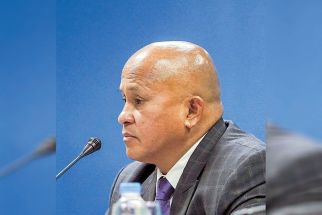‘Duterte repeating Colombia mistakes’
MANILA, Philippines - He may have been the nemesis of the world’s most notorious drug trafficker Pablo Escobar, but former Colombian president Cesar Gaviria said his deadly campaign against drugs was a mistake President Duterte should avoid.
In an opinion article in the New York Times, Gaviria wrote that the military and police should not be allowed to take the lead in an anti-drug campaign, as such would spawn violence with mostly ordinary people as victims.
“That is the message I would like to send to the world and, especially, to President Rodrigo Duterte of the Philippines. Trust me, I learned the hard way,” Gaviria wrote in his article.
“Illegal drugs are a matter of national security, but the war against them cannot be won by armed forces and law enforcement agencies alone. Throwing more soldiers and police at the drug users is not just a waste of money but also can actually make the problem worse,” he observed.
What’s a better approach? Stripping the enormous profits from the illegal drug trade, Gaviria wrote, while ensuring the basic health and human rights of all citizens.
One way of cutting drug profits is through legalization and tight regulation of the industry – an idea that is growing in Latin America, where many countries have suffered from deadly drug violence.
“Locking up nonviolent offenders and drug users almost always backfires, instead strengthening organized crime,” Gaviria pointed out.
He said Colombians “know a thing or two about fighting drugs” as his country “has long been one of the world’s primary suppliers of cocaine.”
Gaviria said the Colombian government has spent billions of dollars in its anti-drug campaign with support from North American and Western European governments. He cited his involvement in taking down Escobar in 1993.
“While we managed to make Colombia a bit safer, it came at a tremendous price,” he lamented.
“My government and every administration since threw everything at the problem – from fumigating crops to jailing every drug pusher in sight. Not only did we fail to eradicate drug production, trafficking and consumption in Colombia, but we also pushed drugs and crime into neighboring countries,” he said.
He explained his vicious tack created new problems, as thousands of people were slaughtered in the anti-drug crusade.
“Many of our brightest politicians, judges, police officers and journalists were assassinated. At the same time, the vast funds earned by drug cartels were spent to corrupt our executive, judicial and legislative branches of government,” he pointed out.
He said his “heavy-handed” way of fighting the drug menace did little to diminish the drug supply and demand in Colombia, much less in markets like Western Europe and the United States.
“In fact, drugs such as cocaine and heroin are as accessible as ever from Bogotá to New York to Manila,” he emphasized.
Old habits die hard
He said the war on drugs “is essentially a war on people,” and that it’s not surprising that many countries “are still addicted” to waging this war as “old habits die hard.”
Gaviria said Colombia’s current president, Juan Manuel Santos, has expressed the same concern. “We are still thinking within the same framework as we have done for the last 40 years,” he quoted Santos as saying.
“Fortunately, more and more governments also concede that a new approach is needed, one that strips out the profits that accompany drug sales while ensuring the basic human rights and public health of all citizens,” Gaviria said.
“If we are going to get drugs under control, we need to have an honest conversation. The Global Commission on Drug Policy – of which I am a founding member – has supported an open, evidence-based debate on drugs since 2011,” he maintained.
“We strongly support reducing drug supply and demand, but differ fundamentally with hard-liners about how this should be achieved. We are not soft on drugs. Far from it,” he stressed.
“What do we propose? Well, for one, we do not believe that military hardware, repressive policing and bigger prisons are the answer,” he said.
He stressed that “real reductions” in drug supply and demand will come through improving public health and safety, strengthening anti-corruption measures – especially those that combat money laundering – and investing in sustainable development.
“We also believe that the smartest pathway to tackling drugs is decriminalizing consumption and ensuring that governments regulate certain drugs, including for medical and recreational purposes,” he added.
While he acknowledged the responsibility of the Duterte administration to address the problem, Gaviria said “there is a real risk that a heavy-handed approach will do more harm than good.”
“There is no doubt that tough penalties are necessary to deter organized crime. But extrajudicial killings and vigilantism are the wrong ways to go,” he said.
He said he had thought the killing of a Korean businessman may have brought Duterte closer to realizing the folly of a violent approach, but his order to bring the military into the picture was another cause for alarm.
“Bringing the army in to fight the drug war, as he now suggests, would also be disastrous. The fight against drugs has to be balanced so that it does not infringe on the rights and well-being of citizens,” Gaviria said.
He reminded Duterte that winning the fight against drugs requires addressing not just crime, but also public health, human rights and economic development.
“No matter what Mr. Duterte believes, there will always be drugs and drug users in the Philippines. But it is important to put the problem in perspective: the Philippines already has a low number of regular drug users,” he stressed.
“The application of severe penalties and extrajudicial violence against drug consumers makes it almost impossible for people with drug addiction problems to find treatment,” he pointed out.
“Instead, they resort to dangerous habits and the criminal economy. Indeed, the criminalization of drug users runs counter to all available scientific evidence of what works,” he added.
He explained that taking a hard line against criminals is always popular for politicians.
“I was also seduced into taking a tough stance on drugs during my time as president. The polls suggest that Mr. Duterte’s war on drugs is equally popular. But he will find that it is unwinnable,” he warned.
“I also discovered that the human costs were enormous. We could not win the war on drugs through killing petty criminals and addicts. We started making positive impacts only when we changed tack, designating drugs as a social problem and not a military one,” he emphasized.
He also said a successful president makes decisions that strengthen the public good.
“This means investing in solutions that meet the basic standards of basic rights and minimize unnecessary pain and suffering,” Gaviria wrote. “The fight against drugs is no exception.”
Strategies that target violent criminals and undermine money laundering are critical, so too are measures that decriminalize drug users, support alternative sentencing for low-level nonviolent offenders and provide a range of treatment options for drug abusers.
”This is a test that many of my Colombian compatriots have failed. I hope Mr. Duterte does not fall into the same trap,” he said.
- Latest
- Trending

































